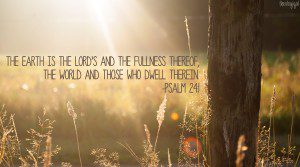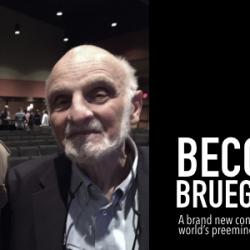This was originally the sermon I preached at Redemption Church on September 21, 2014. It has been edited into a long-form essay here. If you are a pastor, feel free to copy and use any of this.
SHIFT: From Exploitation to Stewardship
The Catholic theologian Ronald Rolheiser says that to be human is to live with an excess of desire. “Desire is always stronger than satisfaction,” he says. (p.3) To be humans is to have an excess of desire. Not all desire is bad. We desire justice, mercy, love, and belonging—all good things. But the quintessential human move is to attempt to maximize our ability to meet our own desires, and minimize the number of our unmet desires.
The problem is that society cannot function very well if everybody is simply trying to realize their own desires. So, we band together and set limits. Ethics, morals, culture, laws, are all about setting limits on how far you can go to meet your own desire. This, we know, is simply part of the human condition: We are all dealing with an excess of desire.
Rolheiser says that for Christians, “Spirituality is, ultimately, about what we do with that desire.” (p.5) What we do with the enduring excess of desire is called spirituality. If our desires and longings rule over us, they threaten our health, and the health of the world. A life ruled by desire will always become destructive.
Think of Adam & Eve, presented with lavish abundance, but they just had to have that forbidden fruit. They immediately began to use the world in illegitimate ways to meet their desires.
God seemed to be aware of this potential. So, God gave humankind a specific vocation, a job to do, something good to desire. Gen 1:26 “Then God said, ‘Let us make humankind in our image, according to our likeness; and let them have dominion…”
This word dominion in Hebrew is radah, which has this connotation of responsibility for leadership and stewardship. That’s the Human vocation. We are made responsible for the leadership and stewardship of the creation God has called “good”. There is no hint of expatiation in the Hebrew concept of radah.
“Be fruitful and multiply,” humans were told, time and again. “Fill the earth and subdue it, have dominion over it.” In Genesis 2 that vocation is extended. “The Lord God took the man & put him in the garden of Eden to till it & keep it.”
The word for “keep” in Hebrew is the word shamar. This is the word from the familiar blessing, “May the Lord bless you and shamar you.” To keep means to take care, and to watch over.
And the word for “till” in Hebrew is the word abad. We know this from the verse, “As for me and my house we will abad the Lord,” To till the earth is render service to, or being a servant of the earth as an act of devotion to God.
Dominion is a kind of stewardship that involves keeping & serving the creation God calls good; making it flourish. Dominion does not involve exploitation.
And to make that point clear, God puts a limit on human desires: “You may freely eat of every tree of the garden; but of the tree of the knowledge of good and evil you shall not eat, for in the day that you eat of it you shall die.” Discipline is imposed on the people. Humans can’t do whatever they want with the earth, because God has retained ownership of the land. We are the stewards. God is the owner.
In Lev. 25:23-24 God says “…the land is mine; with me you are but aliens and tenants. Throughout the land that you hold, you shall provide for the redemption of the land.” The land belongs to YHWH. Our job is to work for its redemption.
Ps 24:1, “The earth is the Lord’s and all that is in it; the world, and those who live in it.” God is the owner of the world; we are the stewards. The owner decides the proper use of his possession (the earth).
1 Kings 21:1-10
1 Later the following events took place: Naboth the Jezreelite had a vineyard in Jezreel, beside the palace of King Ahab of Samaria. 2 And Ahab said to Naboth, “Give me your vineyard, so that I may have it for a vegetable garden, because it is near my house; I will give you a better vineyard for it; or, if it seems good to you, I will give you its value in money.”
3 But Naboth said to Ahab, “The Lord forbid that I should give you my ancestral inheritance.” 4 Ahab went home resentful and sullen because of what Naboth the Jezreelite had said to him; for he had said, “I will not give you my ancestral inheritance.” He lay down on his bed, turned away his face, and would not eat. 5 His wife Jezebel came to him and said, “Why are you so depressed that you will not eat?”
6 He said to her, “Because I spoke to Naboth the Jezreelite and said to him, ‘Give me your vineyard for money; or else, if you prefer, I will give you another vineyard for it’; but he answered, ‘I will not give you my vineyard.’” [notice what he left out… the bit about the ancestral inheritance… interesting]. 7 His wife Jezebel said to him, “Do you now govern Israel? Get up, eat some food, and be cheerful; I will give you the vineyard of Naboth the Jezreelite.”
8 So she wrote letters in Ahab’s name and sealed them with his seal; she sent the letters to the elders and the nobles who lived with Naboth in his city. 9 She wrote in the letters, “Proclaim a fast, and seat Naboth at the head of the assembly; 10 seat two scoundrels opposite him, and have them bring a charge against him, saying, ‘You have cursed God and the king.’ Then take him out, and stone him to death.
…and that’s exactly what they do. The elders plan a banquet, falsely accuse Naboth, kill him, & Ahab takes possession of the vineyard.
If you’re like me, your first though as you read this passage might have been, “Take the money and run Naboth. He’s a king. Inflate your price and get while the getting’s good.” However, we learn that the reason Naboth doesn’t want to sell has to do with stewardship.
“The Lord forbid that I should give you my ancestral inheritance,” Naboth replies, and this phrase ancestral inheritance is key.
When the Israelites settled the Promised Land each of the twelve tribes got part of the land, which was then divided among families and clans of the tribe, each getting their own land. It was their sacred obligation to take care of that land.
You see, God put Israel in the Promised Land for a reason. They were to model faithful living; to be a living breathing picture of shalom. So this “ancestral inheritance” wasn’t just land, it was a vocation. The land didn’t belong to Naboth; Naboth belonged to the land. Naboth would have refused to yield his sacred right to anyone, especially a Samaritan king married to a Sidonian princess who worships Baal.
This was more than just a real estate deal. The transaction Ahab proposed had implications for the vocation of Israel, and the sacred part that Naboth was to play in that as a steward of the land.
A good king of Israel would’ve supported this kind of faithfulness. A good king would want his land filled with guys like Naboth, who were faithful & trustworthy. But Ahab isn’t a good king of Israel. In fact, the writer implies this when he calls him “King Ahab of Samaria.” Naboth is the king of Israel, but he’s not acting like it.
Israel’s kings weren’t supposed to be like the other kings in the land. In fact, when Israel stopped at the Jordan before crossing into the Promised Land, the Lord said to them, “When you get into the land, you’re going to want a king… which is fine, but I have a few rules.” (Dt. 17:14-20)
- Your king must be a brother, not a foreigner: Dt. 17:15 “…One of your own community you may set as king over you; you are not permitted to put a foreigner over you, who is not of your own community.”
- Your king must not become wealthy & thus cease to depend on YHWH: Dt17:16-17 “…he must not acquire many horses for himself, or return the people to Egypt in order to acquire more horses… And he must not acquire many wives for himself, or else his heart will turn away; also silver and gold he must not acquire in great quantity for himself.”
- Your king’s primary job is to meditate upon & study the law; keeping his management practices in line with the memory & vision of Israel Dt. 17:18-20 “When he has taken the throne of his kingdom, he shall have a copy of this law written for him in the presence of the levitical priests. It shall remain with him and he shall read in it all the days of his life, so that he may learn to fear the Lord his God, diligently observing all the words of this law and these statutes, neither exalting himself above other members of the community nor turning aside from the commandment, either to the right or to the left, so that he and his descendants may reign long over his kingdom in Israel.”
If held to this standard, Ahab was failing miserably. He has two palaces: one in Samaria—conquered territory—and a winter palace down in Jezreel at a lower elevation, which was much warmer in the winter. Apparently two palaces wasn’t enough, because Ahab wants Naboth’s Vineyard, too. He wants to make it into a vegetable garden.
We miss the significance of the vegetable garden because we don’t know the history and symbols of Israel. The Promised Land was the place where vineyards grew naturally. The vineyard became a symbol of God’s blessing and promise. Turning a vineyard into vegetable garden would be seen as ominous sign. The Jewish readers of scripture would’ve picked up on this immediately.
“Lord Forbid” Naboth says… and he’s not swearing, the language means something like, “this is profane to me to do because of the Lord.” Ahab cannot see the position he’s put Naboth in. Ahab wants to do whatever he wants to do with the land, forgetting the three things the king of Israel is required to do, and moping when he can’t meet his own desire.
Jezebel sees Ahab moping, and essentially calls him a wuss. “Do you now govern Israel? Get up, eat some food, and be cheerful; I will give you the vineyard of Naboth the Jezreelite.”
She writes letters in Ahab’s name. She seals them with the king’s seal. Jezebel has usurped the king’s power.
The feast was a religious and civic rite. It was their custom, if something needed settling in a town, to have a feast and talk about it. Naboth didn’t see it coming. Once he’s is dead, Jezebel tells Ahab, “Go take possession of the vineyard of Naboth, which he refused to give you for money; for Naboth is not alive, but dead.”
The Hebrew word for “take possession” there is yaras. It’s the exact same term used by God when he gives the land to his people. “You shall take possession [yaras] of the land and settle in it.” (Numbers 33:53). The writer is signally that Jezebel has seized part of a divinely given inheritance. She has usurped not only a king’s authority, but God’s authority as well. She has taken possession (yaras) of land God did not intend for her.
I can’t really be too hard on Jezebel. She’s just doing what kings do in the rest of the world. She doesn’t know what she doesn’t know, and I know the feeling. She doesn’t know Israel’s history with the land. She doesn’t know the law. She doesn’t know Israel’s kings are to be different. She doesn’t know YHWH. In her world, kings can do whatever they want.
Jezebel doesn’t know land belongs to God. She thinks it belongs to her… but that’s not how it is supposed to work in Israel.
God has always been serious about how his people treat the land. And the reason is, that the land constantly entices Israel, and us, to sin. Land is a source of life that has this seductive power, tempting Israel to believe they can live w/out trusting in YHWH.
All the things God put in place to keep the people from forgetting, like a king who’s a brother, doesn’t amass great wealth, and who meditates on the law, or guys like Naboth—those things have been ignored & subverted by Ahab & Jezebel. The result is that everything God was trying to avoid comes to pass:
- The principles of Israel & sovereignty of God are challenged.
- The office of king is usurped by a foreigner.
- The king fails to uphold his duty.
- Neighbor turns against neighbor.
- Justice is perverted.
- A solemn religious & civic rite (the feast) becomes pretext for
- A sham trial;
- Perjury (otherwise known=bearing false witness)
- And finally, murder.
- The law is warped and manipulated to favor the rich over the poor.
- And the king’s avarice results in the death of a righteous man.
- Naboth is murdered
- We find out later, his whole family is murdered, too.
The land has tempted Ahab, with his ready excess of desire. And each of these three characters comes to symbolize different reactions to God’s call to stewardship of land.
Naboth is faithful: he’s the wise man of stewardship.
Jezebel isn’t faithful: she is a symbol of exploitation.
Ahab… what does Ahab symbolize?
This is what I think: Ahab is us… (or rather we are Ahab).
Held captive to limitless desire, pouting if he can’t have what he wants, ruled by desires that are fueled by a culture that ignores God, powerful, but abdicating power, & responsibility to another…. Is it just me or does this sound like a description of the American problem or what?
We are all held captive to limitless desires. We pout & go to pieces if we don’t get what we want. We are filled with a desire stoked by a culture that ignores God. We are powerful but constantly abdicating power to governments & corporations, and as they tear up the planet and kill in our name. We look the other way & let it happen & say, “what could I do?”
Naboth was powerless. Jezebel was doing the only thing she knew to do. But Ahab? Ahab could’ve stopped this whole thing at any time. “Let’s leave Naboth alone. He’s a good man. He does his business. He’s a steward. He doesn’t deserve this injustice.”
Instead, he looks the other way while Jezebel has Naboth murdered.
I don’t fault Ahab for desiring the field. I fault him because he knew what Jezebel would do. He knew it was wrong & he didn’t do anything to stop it.
…all of the excess desire.
This is surely the American problem: we suffer from an excess of desire. What we do with that desire is called spirituality.
Ahab’s problem was he had no spirituality. He was supposed to live humbly & study the law, constantly reminding his people to be stewards of the land, but he didn’t do that.
By all accounts Ahab’s reign was quite successful; it was a great economic time for the Northern Kingdom. His reign was a bit like Bill Clinton’s presidency—economically things were great, but it will always be remembered for a failure of integrity. It’s not like Ahab was fiend for Baal, that was Jezebel. Ahab just wrote the checks. His problem was that he didn’t engage any spirituality. He engaged in economics and war. Eventually his desire wrecks his integrity & he loses his reign.
Rolheiser says our spirituality is about what we do w/our excess desire. Either we’ll learn discipline or we’ll experience dissipation.
Discipline is training our desires, stewarding our lives toward God’s desire for them (vocation).
Dissipation is wasting by misuse, amusement, or self-indulgence; synonyms are words like “binging, going on a bender.”
Discipline leads to stewardship.
Dissipation leads to exploitative practices.
Now with all this story in mind—Naboth, Jezebele, and Ahab—think about the way we relate to our planet today.
Is our use of the world more like discipline, or dissipation?
Do you know what scientists commonly call ecological studies? Dissipation studies: Terrestrial field dissipation studies, soil dissipation studies, habitat dissipation studies, natural resource dissipation studies, petroleum, forest, reef, fisheries dissipation studies…
We have unlimited desire in terms of what we would like to make this planet do. When that desire is not disciplined, we will act in ways that exploit the planet. This exploitation leads to dissipation, which is exactly what we are seeing in our world.
The church’s problem is that we have no spirituality of creation. Because we have no spirituality, we have no disciplines regarding the world & how we use it as Christians.
So what we do instead is pivot to the ideology of culture. We pick a side with conservatives or liberals—an Ahab move—abdicating our vocation as stewards of creation. And this has lead to the dissipation of God’s good creation.
God has not abdicated God’s rights concerning the earth. We might have dominion, but we do not have ownership. The earth is the Lord’s & everything in it. We are held accountable for how we use it. We cannot be cavalier & arrogant about the planet.
I’m not an environmentalist so much as I’m a Christian… so I don’t need to save the planet. But, I do need to be faithful. Concern for the planet is a matter of faithfulness. While everyone else in the world seems to be ruled by their desires, the Christian needs to find discipline. The church needs a spirituality rich enough to fund faithfulness in regard to God’s good creation, otherwise known as stewardship.
I have three simple suggestions on practices that could be a starting place for a spirituality of creation. Interestingly, they coincide with the three specific disciplines Israel’s king was supposed to engage in.
SABBATH: take one day a week and rest from work. Cease from the restless generating of income & activity. This discipline coincides with the requirement that Israel’s king should be a brother, because more than any other discipline, keeping the Sabbath is what made Israel, Israel.
Sabbath doesn’t mean lying around on the couch watching television. Sabbath is the practice of relating to the world from a posture of receptive delight. Get out in the midst of creation. Cook a meal. Take a nap. Take a walk. Eat with friends, Play with your kids. Tend a garden. Go to a museum, movie, concert, or play. Play music. Have a long conversation. Stare at a tree. Take pictures of nature. Sit by a stream. Skip rocks. Stand in a meadow. Gaze at the stars.
Do this and you will start to see what is happening to the planet. I can’t even explain it. You’ll just have to trust me. If you’ll do Sabbath every single week, you’ll start to connect back to the earth in healthy ways.
SIMPLICITY: Simplicity is about moving toward less in everything. This discipline corresponds to the call for Israel’s king to refrain from amassing great wealth and lands.
Simplicity is, forgive me, quite simple. Use less, dispose of less, spend less, consume, store, acquire less. Simplicity means less electricity, less money, less worry, less anxiety, less fear.Who could do with a little less worry, anxiety, & fear? Losing those things is a movement toward simplicity.
You know the most radical discipline any of us could do in our lives right now? It would be to: simplify our schedule.
Most of what humans do to harm the planet is done in the name of things like speed, expediency, efficiency, convenience. (If you want a great book on this I highly recommend Slow Church by Christopher Smith & John Pattison. They are thinking carefully about how church life and practices must become more simple… slower). They point out that we are so busy we don’t have the time to be good stewards. I mean, nobody eats McDonalds because it tastes good. We eat it because it’s fast. Pursuing the God-ordained human vocation of stewardship can never become fast and easy. You can’t streamline calling & optimize it for efficiency.
STUDY: We have to become students of our societies, and understand what our contemporary industrial world is doing to the planet. This coincides to the call for Israel’s king to remain a student of the law.
Read up on the environment. Watch movies. Read articles and books. And, as you read try not to pivot to your favorite political ideology. Above all, involve the scriptures. Here are four quick issues you could focus on.
- Population growth: In 1804 there were 1 billion people on the earth. Today there are 7 billion. Five out of seven billion lack basic things like food, water, shelter, education, healthcare, and peace.
- Depletion of Natural Resources: Our world runs on fossil fuels. Trace anything you do back up the line and at some point you will find a fire. Fossil fuels will one day run out. There are other natural resources that are being dissipated as we speak. Learn about the forests, the ocean, animal habitats, the atmosphere,
- Waste disposal: Manufacturing, packaging, consumption, planned obsolescence it all produces waste. We are slowly running out of safe places to put it that are safe. Chemicals from manufacturing, refrigeration, propellants are building up in groundwater. Learn about it.
- Climate Change: The world is getting hotter… this is the most serious problem of them all. The planet is changing. Dramatically. Rapidly. Some say the problem is man made, some say isn’t. But for the Christian, it shouldn’t matter. Our job is to be faithful whether or not it makes a difference on Global Warming.
These 3 disciplines—Sabbath, simplicity, study—could form the beginning of a Spirituality of creation. These simple spiritual practices can train us to participate in our God given vocation to care for creation.
Wendell Berry says, “There are no unsacred places; there are only sacred places and desecrated places.” We could use with more sacred places & fewer desecrated places, yeah?
Christians should be leading the way on this, shifting from exploitation to stewardship; not for political reasons, but as a matter of stewardship. Every day is a chance to shift toward stewardship & discipline in terms of the way we care for creation. Our presence in any place, our stewardship of that place becomes an act of worship, making that place the place of a sacred encounter with the creator.













